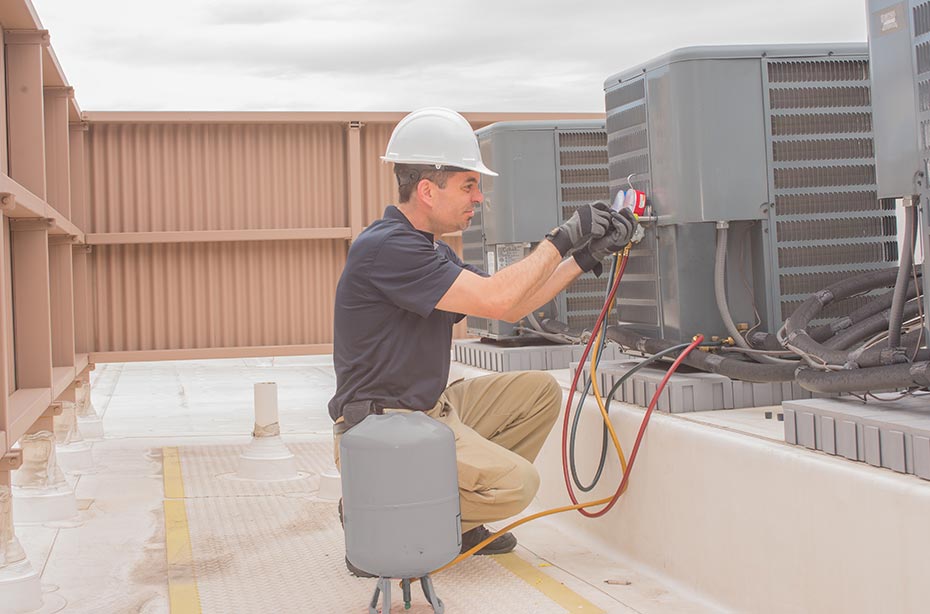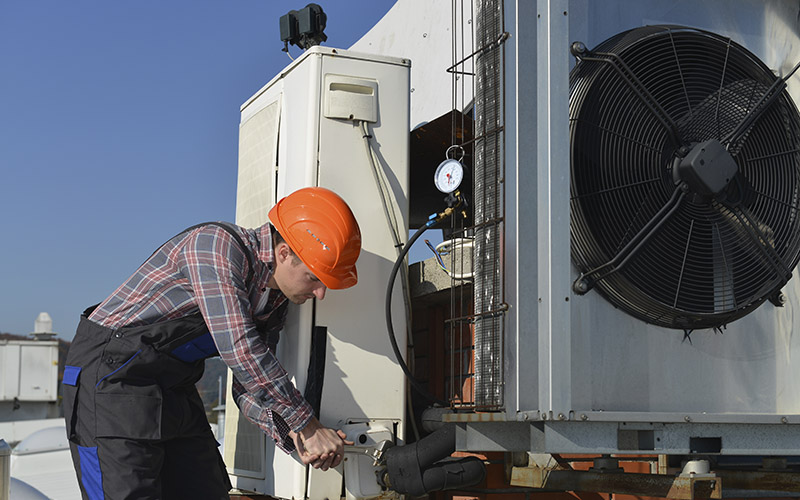Picking In Between a Heat Pump and Heater: Secret Considerations for Your A/c Requirements
When assessing heating alternatives for heating and cooling requires, the decision in between a warm pump and a furnace can be intricate. Each system uses unique advantages customized to particular climates and power efficiency objectives. Comprehending these distinctions is necessary for making an educated selection. Secret elements such as installment expenses and ecological effect further make complex the selection procedure. Which option absolutely lines up with one's convenience and sustainability preferences? The adhering to sections will explore these factors to consider carefully.
Comprehending Heat Pumps: Exactly How They Work and Their Benefits
While several house owners consider different heating alternatives, understanding just how heat pumps function and their benefits can significantly affect their choice. Warmth pumps operate by moving warmth rather than creating it. In the wintertime, they remove heat from the outdoors air or ground and transfer it inside, while in the summer, they reverse this procedure, cooling down the home by removing warmth outside. This dual performance makes them functional for year-round climate control.One of the main advantages of heatpump is their energy effectiveness. They make use of considerably less electrical energy contrasted to conventional heater, possibly causing lower energy costs (heat pump installation ooltewah tn). Additionally, heatpump have a smaller carbon footprint, making them an eco-friendly selection. They also need much less upkeep than standard systems, contributing to lasting price savings. In general, recognizing the mechanics and benefits of heatpump can help home owners make informed choices concerning their home heating and cooling down needs
Exploring Heating Systems: Kinds, Procedure, and Benefits
Heaters can be found in different types, consisting of gas, electrical, and oil designs, each with distinct operational systems. Comprehending these distinctions is crucial, as they impact efficiency and heating efficiency. In addition, heaters supply countless advantages, such as regular warm outcome and dependability in chillier environments.
Kinds of Furnaces
Home heating systems can vary considerably in layout and operation, with heaters being a popular option among home owners. There are numerous kinds of heating systems, each utilizing various gas sources and modern technologies. Gas heating systems are common, leveraging all-natural gas to create warmth effectively. Electric heating systems, on the other hand, make use of electric resistance to produce heat, frequently preferred for their straightforward setup. Oil heating systems, while much less usual, are effective in locations with limited gas accessibility (ductless mini splits). Furthermore, condensing furnaces maximize power efficiency by reusing and recording exhaust gases. Each type operates via a system of heat exchangers and ductwork to distribute cozy air throughout a home. Understanding the distinctions in between these furnace types is essential for informed a/c choices
Benefits of Furnaces
For homeowners seeking trusted warmth during chilly months, the benefits of heaters are significant. Heating systems supply regular heating, guaranteeing also temperature levels throughout the home. They are specifically effective in extreme chilly, usually outperforming heatpump in frigid conditions. Various types, including gas, electric, and oil heating systems, use adaptability to meet diverse needs and preferences.Furnaces also have a tendency to have lower preliminary setup expenses compared to heatpump, making them a more available choice for lots of. Their robust design contributes to a longer life-span, with several devices lasting over 15 years with correct upkeep. Furthermore, modern-day heaters are usually outfitted with advanced technology for enhanced effectiveness, which can result in reduced power costs. On the whole, heating systems stay a reliable choice for effective home heating.

Power Efficiency: Comparing Warm Pumps and Furnaces
When contrasting energy efficiency in between warmth pumps and furnaces, the Seasonal Energy Effectiveness Proportion (SEER) plays an important function in figuring out efficiency. Additionally, an operational expense evaluation reveals the long-lasting monetary ramifications of each system. Recognizing these factors can lead property owners in making informed choices regarding their heating remedies.
Seasonal Power Effectiveness Proportion
Power efficiency plays a necessary duty in the decision-making procedure in between warm pumps and furnaces, particularly when taking into consideration the Seasonal Power Effectiveness Proportion (SEER) This statistics actions the cooling efficiency of warm pumps over an entire air conditioning period, offering a standard method to review efficiency. Greater SEER rankings indicate better energy efficiency, converting to reduced power consumption and decreased utility bills. In contrast, furnaces are generally evaluated using the Annual Gas Use Effectiveness (AFUE) score, which reflects home heating performance. When contrasting these two systems, homeowners should focus on SEER scores for heatpump, as they directly influence general power cost savings and ecological sustainability. A thorough understanding of SEER can notably affect the long-term satisfaction and cost-effectiveness of the picked heating and cooling solution.
Functional Cost Analysis
Understanding the functional costs related to warm pumps and heating systems is vital for home owners assessing their options. Warmth pumps usually offer greater energy effectiveness, converting electrical power into warmth with minimal waste. This causes lower month-to-month energy expenses, specifically in moderate climates. Alternatively, conventional furnaces, especially gas versions, may have reduced upfront expenses yet can incur greater functional expenses in time as a result of fuel costs and performance ratings.Moreover, heatpump can work as both home heating and cooling systems, potentially minimizing the need for separate a/c devices. While initial investments for heatpump might be higher, their long-term financial savings in energy performance can make them a more cost-effective selection for many families. Mindful analysis of local energy rates is important to determine the finest choice.
Installment Prices: What to Anticipate for each and every Heating System
Installation costs for furnace can vary significantly between heatpump and heaters, affecting house owners' choices. Warm pumps normally have greater in advance setup expenses, normally varying from $3,500 to $8,000, depending upon the system size and complexity of installation. This consists of the exterior system, indoor handling system, and required ductwork adjustments. On the other hand, heating systems have a tendency to have reduced initial costs, averaging in between $2,500 and $6,000, which can be appealing for budget-conscious homeowners. Installation costs can enhance if comprehensive ductwork is required.Moreover, the choice of gas type for furnaces-- all-natural gas, propane, or electrical-- can likewise impact installment expenses. While warmth pumps use energy efficiency, their first investment may hinder some purchasers. Ultimately, examining installment costs together with long-lasting savings and effectiveness will help property owners in making educated decisions concerning their furnace.
Environment Considerations: Which System Executes Better in Your Location
How do climate problems influence the efficiency of heater? The performance of warmth pumps and heating systems can differ greatly relying on the local environment. In modest climates, heatpump succeed by efficiently moving warmth from the outside air, making them an energy-saving choice. Their efficiency decreases in very cool temperatures, where they might have a hard time to draw out enough heat. On the other hand, heating systems, specifically gas models, offer trusted and consistent heat no matter of exterior problems, making them better in cooler regions.In locations that experience milder winters, heat pumps can operate efficiently year-round, supplying both home heating and air conditioning. On the other hand, areas with extreme winters months often benefit from the robustness of furnaces. Ultimately, comprehending the local environment is essential when choosing between a heatpump and a furnace, as it straight influences their functional effectiveness and overall efficiency.
Maintenance Needs: Long-Term Look After Heat Pumps vs. Furnaces
While both warmth pumps and heaters need regular upkeep to guarantee peak efficiency, their particular demands and treatment routines differ substantially. Heaters commonly need much less regular attention, with yearly inspections sufficing to inspect for gas leakages, clean filters, and analyze general capability. Their easier layout commonly enables simple repairs.In comparison, heatpump demand biannual upkeep due to their double duty in heating and air conditioning. This click here to find out more consists of cleaning coils, inspecting more tips here cooling agent levels, and making sure that both the outside and interior units work at their ideal. Additionally, heatpump upkeep frequently includes even more intricate elements, making expert maintenance essential.Neglecting maintenance can result in reduced efficiency and enhanced energy prices for both systems. Inevitably, property owners must take into consideration these long-term care requirements when choosing in between a heat pump and a furnace, as positive upkeep can expand the lifespan and performance of either system significantly.
Ecological Influence: Picking a Lasting Home Heating Alternative
The ecological influence of heater is an essential assessment for house owners looking for sustainable choices. Heatpump are normally a lot more energy-efficient than standard heaters, as they move warm instead than produce it, significantly decreasing carbon discharges. By making use of renewable resource resources, such as air-source or geothermal heatpump, house owners can additionally reduce their ecological footprint.On the other hand, all-natural gas heaters discharge greenhouse gases and add to air pollution, though they typically offer higher warmth outcome. Improvements in innovation have led to the growth of high-efficiency furnaces that decrease emissions.Ultimately, choosing a home heating system includes weighing performance against ecological impact. Home owners are motivated to reflect on regional energy resources and motivations for sustainable systems, guaranteeing a selection that lines up with both individual comfort and ecological responsibility. The decision influences not only prompt convenience yet likewise lasting sustainability and environmental health and wellness.
Frequently Asked Concerns
Just How Lengthy Do Warmth Pumps and Furnaces Generally Last?
The life-span of heatpump normally ranges from 15 to twenty years, while heaters can last between 15 to thirty years. Normal upkeep considerably impacts their long life and efficiency in supplying home heating remedies.
Can I Use a Heatpump in Very Cold Climates?
Heatpump can run in very cool environments, but their effectiveness reduces as temperature levels drop. In such conditions, additional home heating resources might be essential to maintain comfortable indoor temperatures and assure peak performance.

What Is the Sound Level of Heat Pumps Versus Furnaces?
The sound levels of warmth pumps and heaters vary considerably. Usually, warm pumps run more quietly than typical heating systems, making them more suitable for those conscious seem, while furnaces might produce louder functional noises throughout heating cycles.
Are Warmth Pumps Suitable for Both Heating & Cooling?
Heat pumps are without a doubt appropriate for both home heating and cooling (ductless mini splits). They operate by transferring warm, giving effective temperature level control year-round, making them a versatile option site for homeowners seeking an all-in-one cooling and heating service
What Dimension Furnace Do I Need for My Home?
Figuring out the appropriate size furnace for a home calls for assessing aspects such as square footage, insulation high quality, neighborhood environment, and the home's layout. Consulting a professional can ensure an exact assessment and ideal comfort. Warm pumps typically provide greater power performance, converting electrical energy into warm with marginal waste. In modest environments, warmth pumps succeed by successfully transferring heat from the outside air, making them an energy-saving choice. Alternatively, heaters, particularly gas models, offer trusted and consistent warm regardless of outside conditions, making them more suitable in chillier regions.In areas that experience milder winter seasons, heat pumps can operate effectively year-round, offering both heating and cooling. Heat pumps are generally more energy-efficient than conventional furnaces, as they transfer warmth instead than produce it, significantly decreasing carbon emissions. By utilizing eco-friendly power resources, such as geothermal or air-source heat pumps, homeowners can further decrease their eco-friendly footprint.On the various other hand, natural gas furnaces emit greenhouse gases and add to air pollution, though they typically offer greater warm output.
Comments on “Top Mistakes to Avoid During heat pump installation ooltewah tn”